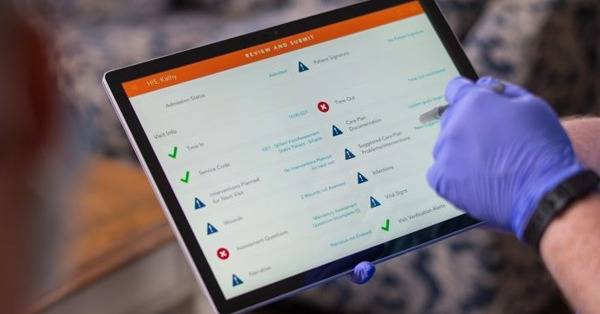- Solutions
- Solutions
- Home Health
- Hospice
- Life Plan Community
- Palliative Care
- Private Duty
- Senior Living
- Skilled Nursing
- Skilled Nursing
- Skilled Nursing Software
- Advanced Insights
- Customer relationship management
- Data and analytics
- Financial & operations management
- Marketing
- Nutrition management
- Referral management
- Regulatory compliance
- Retail management
- Resident engagement
- Revenue cycle management
- Skilled nursing interoperability
- Partners
- Blogs
- Resources
- About

The role of population health in value-based care
The concept of population health is not new. But with the shift toward value-based care, implementing the concepts behind population health is more important than ever. These concepts are all about effectively and efficiently taking appropriate care of specific populations to keep total cost of care low while providing high quality of care and improving outcomes.
Population health and why it matters
Population health is about focusing on groups of patients to positively impact their health outcomes. These groups could include patients who have complex chronic diseases that have the potential to result in negative outcomes like medical complications or hospital readmissions, including diabetes, heart failure or chronic obstructive pulmonary disorder (COPD). Or, aside from disease states, population health could focus on those with social risk factors that might negatively affect their health.
Effective management of these patients and residents includes not only monitoring their disease state, but also evaluating what we call “social determinants of health” that can affect health outcomes. Do they live alone or with others? Do they have support systems? Do they have access to immunizations, healthy food and other preventive care? Do they have access to a healthcare provider who can identify symptoms or changes in condition early enough to affect their quality of life?
The reason population health is such a focus area now is because value-based healthcare models are growing. CMS has told us that by 2030, they expect 100% of Medicare recipients to be in some sort of value-based care relationship, as well as a large percentage of Medicaid recipients. As providers strive to be successful in value-based care delivery models they’ll need to deliver care efficiently and have great outcomes. The way to do that is to identify opportunities to positively impact populations that have a propensity for health challenges, and really focus on delivering comprehensive, efficient, high-quality care for those patient populations they serve. That’s the right thing for the patients, and also supports success in value-based care models.
The importance of integrated networks
Because value-based care is about efficiency and effectiveness, the degree of integration in care networks is important. Well-integrated networks help avoid duplication of care by using comprehensive, accurate patient data to support better care decisions. Having an integrated care team—not just in your facility, but also including home care providers and others—helps ensure everyone has all the information they need for collaborative, patient centric interventions that deliver the best possible patient care.
3 steps toward successful population health management
How can you get your organization on the path to more effective population health management? Here are three things you can begin doing right now to move your organization in the right direction.
1. Know your population
Successful population health management begins with knowing your population. And to do that, you need to gather and analyze your data. This is how you’ll understand how well you’re delivering care—not in a generalized, blanket way, but at a detailed level of how well you’re delivering care and really having an impact on outcomes. Do you have the right systems in place, equipment available, and training for your staff to provide the best care possible for the unique populations you serve? If your EHR doesn’t give you the data you need to do that analysis and truly understand your population, you’ll be at a disadvantage as business increasingly shifts to value-based care. Work with your EHR vendor as soon as possible to ensure you have access to the data and analysis you need to fully understand your patient population, including how well preventive care is administered, how well you are driving quality and how those factors support excellent outcomes for your population.
2. Look for opportunities to meet the needs of your population
Once you understand your data, mine it for opportunities. These can come in many forms: Maybe it’s education about a specific condition or procedure where your organization has expertise. Maybe it’s a close relationship or integration with a specific provider that enhances care coordination and outcomes. Identify and leverage these opportunities with referral partners, caregivers and patients.
3. Be a preferred partner
Another aspect to consider is the network you’re part of. If you can “speak the same language” as your referral partners, you’ll have an advantage. For example, if you work with a hospital that specializes in joint replacements, make sure you have the on-staff expertise to care for those patients. To prove your expertise, gather data on your successes related to outcomes like rehab goals and hospital readmissions. Make sure your staff has the training, equipment and systems in place to take the best possible care of those patients and clearly articulate that to your referral and network partners.
Overcoming headwinds
Every organization wants to take the best possible care of the populations they serve. The biggest obstacle right now is not having access to all the information we need to deliver care effectively. There is still a lot of work to be done to make it easier to gather and share important data from hospitals, post-acute facilities, family members and the patients themselves.
Make sure you work with an EHR partner that has a solid platform with a robust integrated ecosystem and can accurately deliver the data you need so you can analyze your population and the care you provide. Having and understanding that information is the first step to making sure you can deliver coordinated care across the continuum and enhance the patient outcomes that are so crucial to success under value-based care.
Request a demo today for a closer look at MatrixCare.
Allison Rainey
As our Head of Nursing and Clinical Informatics, Allison Rainey oversees the deployment of clinical technologies. As a Registered Nurse and License Family Practitioner, Allison drives a caregiver-first approach in our products, collaborating closely with product leaders to ensures our products and services prioritize the needs and challenges faced by healthcare providers. By aligning workflows, designs, and overall product strategy, Allison strives to offer the most user-friendly, clinically superior, and efficient suite of comprehensive solutions in the industry. Allison brings extensive post-acute care experience from her 20-year tenure at NHC, one the largest publicly traded Senior Care providers in the U.S. She is a seasoned leader in population health management strategy, clinical reporting and analytics development, and inpatient hospital care. In her most recent role as AVP of Clinical Information Technology, she oversaw the deployment and utilization of various clinical technologies, including the MatrixCare EHR, across the extensive NHC network. Allison holds a Bachelor’s and a Master’s in Nursing from the University of Tennessee.
Related Posts



See MatrixCare in action
Start by having a call with one of our experts to see our platform in action.
MatrixCare offers industry-leading software solutions. Thousands of facility-based and home-based care organizations trust us to help them improve efficiency and provide exceptional care.
© 2024 MatrixCare is a registered trademark of MatrixCare. All rights reserved.





